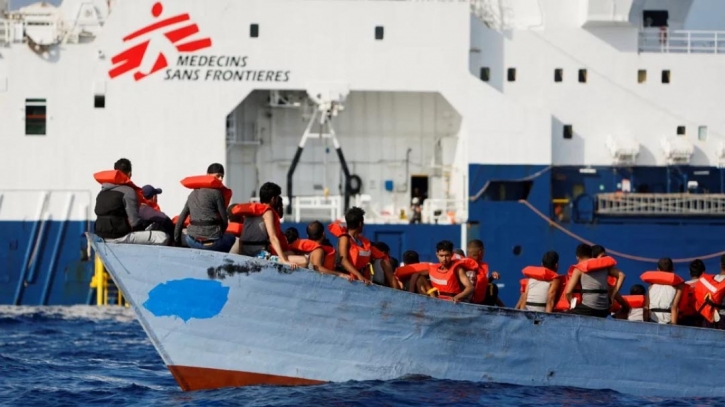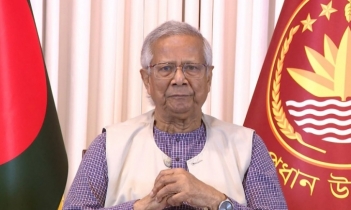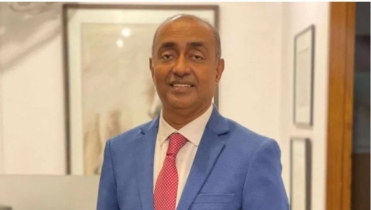
Reports frequently emerge of Bangladeshis disappearing or perishing while attempting to cross the perilous Mediterranean Sea in pursuit of a better life in Europe. This perilous journey not only exposes Bangladeshi youth to inhumane conditions and brutal treatment but also subjects them to life-threatening risks in their quest for a brighter future on the continent.
Records from UNHCR, the UN Refugee Agency, indicate that approximately 13,000 Bangladeshis undertook the hazardous journey across the sea and successfully reached Italy last year.
The preceding year saw about 15,000 Bangladeshis attempting the same route.
The Ministry of Home Affairs identifies three districts – Cox's Bazar, Mymensingh and Jessore – as major hubs for illegal immigration and human trafficking. The government is now considering the establishment of additional special tribunals in districts with high incidences of cases under the Prevention and Suppression of Human Trafficking Act.
Recently, on February 15, a boat fire off the coast of Tunisia claimed the lives of eight Bangladeshis en route to Europe.
Authorities rescued 27 Bangladeshis from the boat, and the Bangladesh mission in Libya said five of the eight deceased had been from Rajoir upazila of Madaripur.
Earlier, on November 3, 30 Bangladeshis, including a minor, were rescued from the Libyan coast in the Mediterranean by a rescue ship of the charity Doctors Without Borders (MSF). The rescued people said they had reached Libya's capital Tripoli via Bahrain and Istanbul by plane from Bangladesh.
Before the voyage, they said, they had to spend three to four days in captivity. Other than lacking food and water, they said they had to endure torture as well.
This ordeal is a familiar experience for many who manage to reach Europe or are rescued from boats during their perilous journey.
UN data
Last year 157,651 people crossed the Mediterranean to reach Italy, according to data from UNHCR.
As many as 12,774 of them were Bangladeshis, making them the fourth most common nationalities of sea arrivals.
In the previous year, 14,971 Bangladeshis tried to enter Italy by sea.
In 2023, the number of people who went missing or died on the journey is 1,897 – the highest since 2018.
On the other hand, 270,180 people tried to enter European countries by sea and 3,760 of them went missing or died in the process. It is believed that there were hundreds of Bangladeshis among them.
UNHCR data says those who try to reach Italy by sea from Libya are mostly citizens of Bangladesh, Egypt or Syria.
In December, authorities detained around 1,300 people while they were crossing Italy's northern border with Slovenia. UNHCR reported over 12,000 entries through the area in 2023, many of them being citizens of Afghanistan, Bangladesh and Pakistan.
Preferred route for traffickers
UNHCR reports seven routes utilized for illegal entry into Europe, all originating from Libya or Turkey. Among these, the Central Mediterranean route stands out as the most popular choice. Illegal migrants perceive it as relatively "safe" for crossing from Libya to Italy. Influenced by assurances from brokers, Bangladeshis spend significant sums to reach Libya or Turkey, marking the initial phase of their journey to Europe. Brokers demand Tk10-Tk15 lakh upfront as the cost of passage to Europe, often subjecting migrants to physical abuse for additional funds after their journey commences.
Human trafficking hotspots
The home ministry’s Public Security Division in its National Plan of Action Prevention and Suppression of Human Trafficking for 2023-25 updated on December 31 identifies three districts as hotspots for human trafficking: Cox's Bazar, Mymensingh and Jessore.
The report highlights around 3,700 pending cases related to human trafficking, involving approximately 34,500 accused individuals.
October 2022 saw the publication of the first national research report on human trafficking in the country, initiated by the government. It mentions a large number of human trafficking cases filed with the courts and police across the country. Despite efforts such as the establishment of anti-trafficking tribunals across seven divisions and the enactment of the Prevention and Suppression of Human Trafficking Act, challenges persist in bringing cases to trial and securing convictions.
Why is human trafficking not going down?
According to the Global Report on Trafficking in Persons 2020 by the United Nations Office on Drugs and Crime, Bangladesh is susceptible to human trafficking owing to the economic challenges faced by its population.
Despite a significant reduction in poverty rates – by approximately 30% from the early 1990s to the late 2010s – many individuals in rural areas continue to grapple with limited economic prospects, remaining below the poverty line.
Traffickers exploit this vulnerability by enticing those living in impoverished conditions with the prospect of higher earning opportunities in North America, Europe and the Middle East, as outlined in the report.
What do experts have to say?
Dr Mohammad Jalal Uddin Sikder, immigration expert and professor at North South University, stressed the importance of raising awareness among immigrants and engaging in discussions with relevant stakeholders both domestically and internationally. He emphasized the need to research why individuals were discontent and taking significant risks to migrate abroad.
Dr Sikder called for holding brokers accountable and conducting dialogues with the governments of countries where trafficking operations were prevalent, particularly mentioning transit points such as Libya, Turkey and Dubai.
He emphasized the importance of informing immigrants that legal migration coupled with proper training offered more opportunities for respectable earnings and a sense of security.
Meanwhile, a senior official at home ministry underscored Bangladesh’s zero-tolerance stance on illegal immigration, mentioning the government's collaboration with national and international organizations, civil society and the United Nations to prevent and combat human trafficking.
“The government is also trying to reach out to every victim and hold every perpetrator accountable in line with the current national action plan,” the official said, requesting anonymity.
The official went on to say that the heinous crime of human trafficking had trapped women, men and children in various forms of exploitation inside and outside the country. “The national action plan gives special emphasis to addressing these factors. Since coming to power, the government has been making earnest efforts to prevent all forms of human trafficking.”
State Minister for Ministry of Expatriates' Welfare and Overseas Employment Shafiqur Rahman Chowdhury said the government was making efforts to prevent illegal migrations to Europe.
“My request to all – do not try to go abroad illegally.”





































